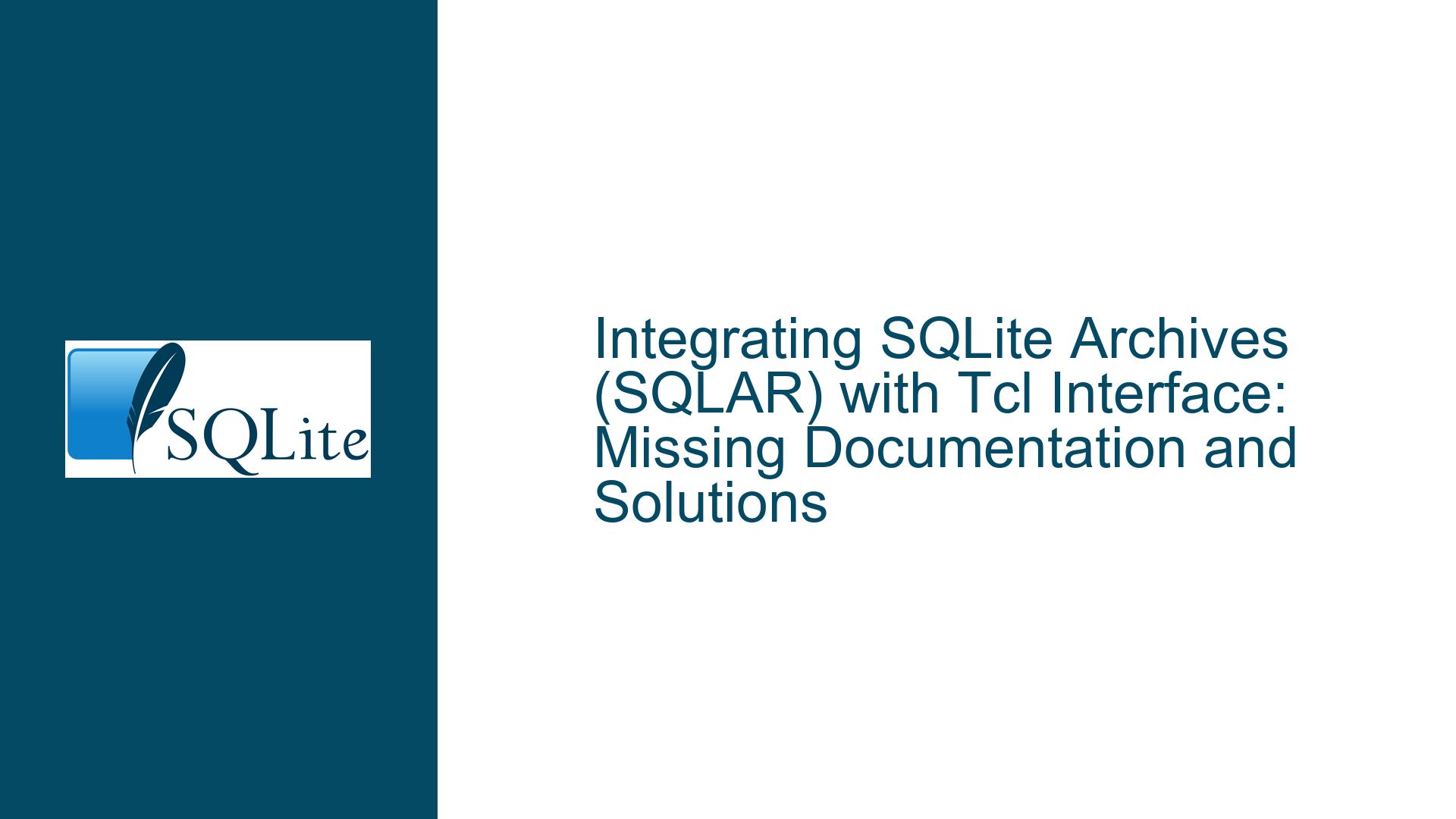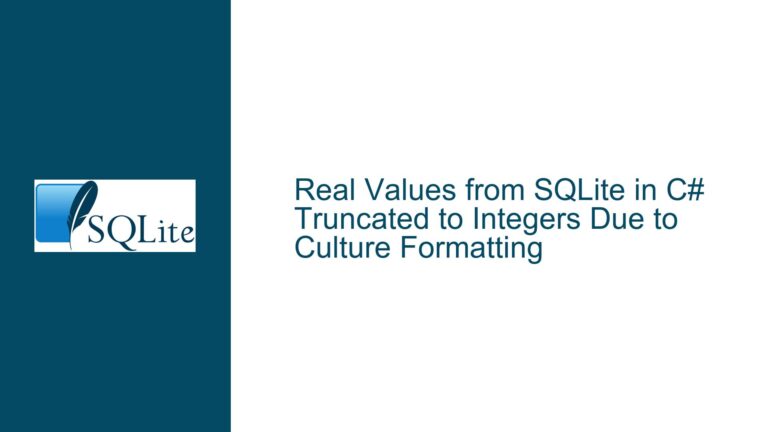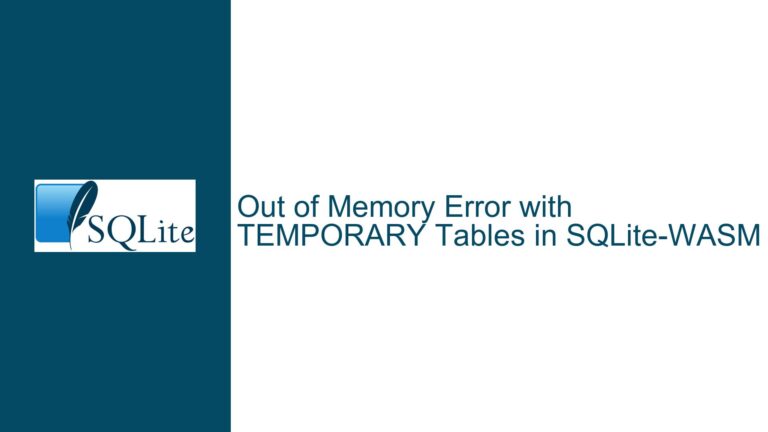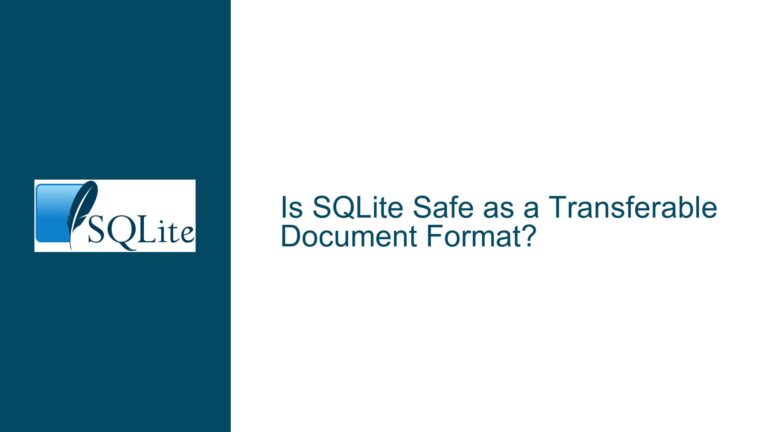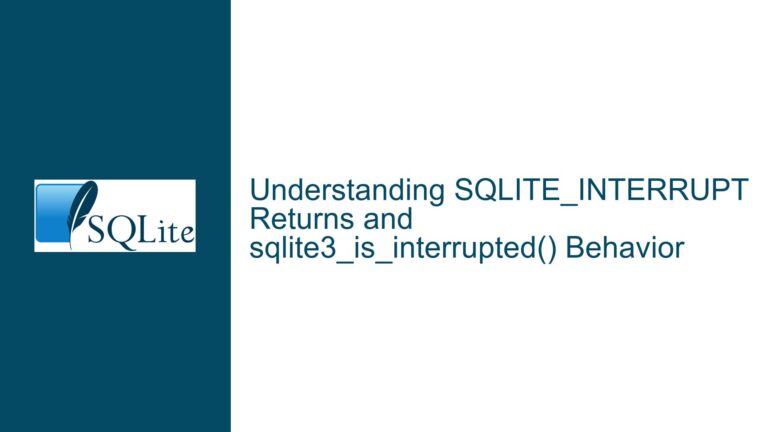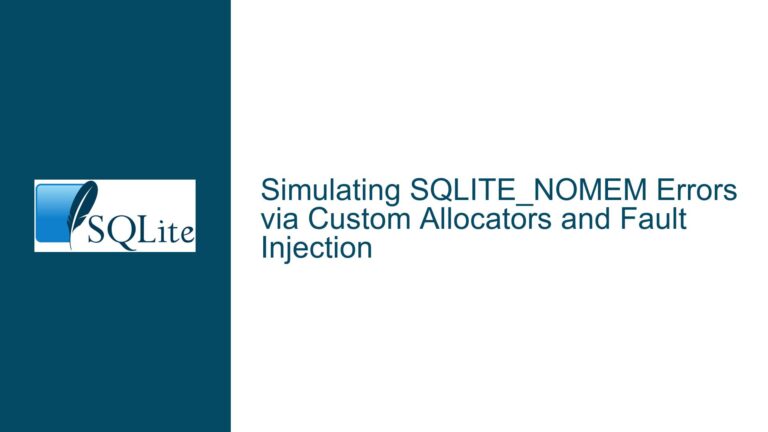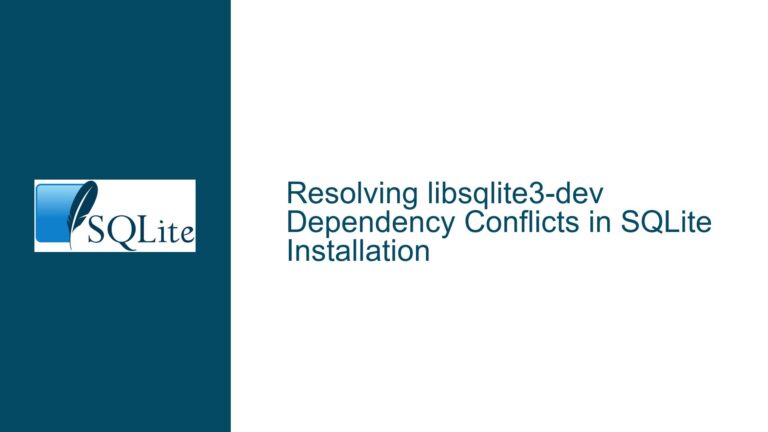Integrating SQLite Archives (SQLAR) with Tcl Interface: Missing Documentation and Solutions
Understanding SQLAR Integration Gaps in Tcl SQLite3 Bindings
Issue Overview
The SQLite Archive (SQLAR) format enables storing files and directories in a single SQLite database file, combining compression and metadata management. While the SQLite command-line interface (CLI) provides built-in support for SQLAR via .archive commands, the official Tcl SQLite3 interface (tclsqlite) lacks explicit documentation and native methods for interacting with SQLAR files. Developers attempting to use SQLAR through Tcl face ambiguity in three areas:
- Missing Tcl Bindings for SQLAR Functions: The CLI’s
.archivecommands (e.g., create, extract) have no direct equivalents in the Tcl API. - Undocumented Extension Integration: The
sqlar.cextension, which implements SQLAR logic, is not mentioned in Tcl-specific documentation, leaving developers unsure how to load or use it. - Compression Handling: SQLAR relies on zlib compression (DEFLATE), but Tcl’s SQLite3 interface does not clarify how compression/decompression workflows map to Tcl scripts.
This creates a dependency gap: developers must choose between invoking the CLI (via exec) or reverse-engineering the sqlar.c extension’s integration with Tcl. The absence of Tcl-specific examples or API references forces trial-and-error approaches, risking data corruption or inefficient workflows.
Root Causes of SQLAR-Tcl Integration Challenges
1. Architectural Separation Between CLI and Tcl Bindings
The SQLite CLI’s .archive commands are convenience wrappers around SQL statements that interact with the sqlar schema and sqlar_compress/sqlar_uncompress functions. However, the Tcl interface exposes raw SQL execution capabilities without abstracting these into Tcl-specific procedures. Developers must reimplement CLI-like logic manually.
2. Implicit Dependency on the sqlar.c Extension
The sqlar.c extension is required to enable SQLAR functionality but is not compiled into the standard Tcl SQLite3 library. Loading it dynamically requires understanding Tcl’s load command and ensuring binary compatibility between the extension, SQLite core, and Tcl runtime. Misalignment in compilation settings (e.g., zlib availability) can silently disable compression.
3. Ambiguity in Schema and Function Usage
The SQLAR schema defines a table sqlar with columns name, mode, mtime, sz, and data. The sqlar_compress and sqlar_uncompress functions handle compression, but their usage is only hinted at in CLI documentation. Tcl developers may overlook schema requirements or misuse the functions, leading to archives that appear valid but fail during extraction.
Comprehensive Solutions for SQLAR Management in Tcl
Step 1: Compiling and Loading the sqlar.c Extension
Download sqlar.c from the SQLite source repository. Compile it as a loadable extension using a command like:
gcc -g -fPIC -shared sqlar.c -o libsqlar.so -lsqlite3 -lz
Ensure zlib development headers are installed. For Windows, use cl.exe or MinGW with appropriate flags.
In Tcl, load the extension before opening the database:
load ./libsqlar.so
sqlite3 db archive.sqlar
db enable_load_extension 1 ;# Required if not enabled by default
Step 2: Implementing SQLAR Schema and Functions
Create the sqlar table explicitly to avoid reliance on CLI automation:
db eval {
CREATE TABLE IF NOT EXISTS sqlar(
name TEXT PRIMARY KEY,
mode INT,
mtime INT,
sz INT,
data BLOB
);
}
Verify the presence of sqlar_compress and sqlar_uncompress using db function list (if supported) or by testing a query:
set test [db eval {SELECT sqlar_compress('test')}]
if {$test eq ""} { error "Compression functions missing" }
Step 3: Inserting Files with Compression
To add a file to the archive, read its content, compress it, and store metadata:
proc add_file {db_path file_path} {
sqlite3 db $db_path
set content [read [open $file_path rb]]
set compressed [db eval {SELECT sqlar_compress($content)}]
set mode [file attributes $file_path -permissions]
set mtime [file mtime $file_path]
set size [file size $file_path]
db eval {
INSERT INTO sqlar(name, mode, mtime, sz, data)
VALUES ($file_path, $mode, $mtime, $size, $compressed)
}
}
Adjust file attributes for platform-specific mode handling (Unix vs. Windows).
Step 4: Extracting Files
Decompress data using sqlar_uncompress, ensuring the output size matches the original sz to detect corruption:
proc extract_file {db_path file_path output_dir} {
sqlite3 db $db_path
db eval {
SELECT mode, mtime, sz, sqlar_uncompress(data, sz) AS data
FROM sqlar WHERE name = $file_path
} {
set out [file join $output_dir $file_path]
file mkdir [file dirname $out]
set fd [open $out wb]
puts -nonewline $fd $data
close $fd
file attributes $out -permissions $mode
file mtime $out $mtime
}
}
Step 5: Validating Archive Consistency
Use Tcl’s file system commands to verify extracted files against sz, mode, and mtime. Recompress extracted data and compare it with the stored data blob to detect silent compression failures.
Step 6: Handling Edge Cases
- Large Files: Use incremental I/O and
sqlar_compressin chunks to avoid memory exhaustion. - Empty Files: Skip compression, as
sqlar_compressmay return NULL. - Symbolic Links: Store link targets in
dataand setmodeto 120000 (Unix symlink flag).
Final Notes
While Tcl’s SQLite3 interface lacks built-in SQLAR commands, the sqlar.c extension provides all necessary SQL functions. Developers must reimplement CLI logic in Tcl, paying attention to schema management, compression edge cases, and platform-specific metadata. Directly invoking the CLI via exec remains a fallback but introduces external dependencies and potential performance overhead.
